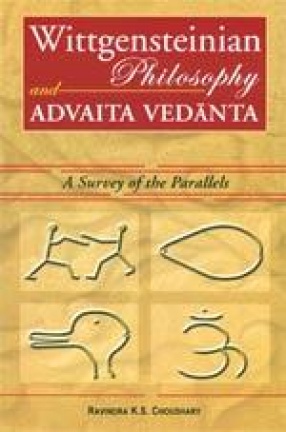The philosophy of Wittgenstein and the Advaita Vedanta Philosophy are two philosophical traditions far apart in time and cultural space yet they possess striking similarities. This painstaking research carried out with a rare thoroughness by an erudite scholar, Ravindra K.S. Choudhary, shows that there are illuminating parallels between them even while recognizing their legitimate differences. The work argues that though Advaita Vedanta did not exert a direct influence over Wittgenstein, the philosopher owes much to Schopenhauer who was a great admirer of the Upanisads. Examining a variety of Wittgenstein’s works earlier as well as later and the basic texts of Vedanta, the Upanisads, the Brahmasutra and the Bhagavad-Gita, along with Sankara’s interpretations of them, it delves into their similarities vis-Ã -vis the question of reality, the realm of value and some central issues of ethics and religion. It observes that, for instance, Wittgenstein’s notion of the mystical (das Mystische) is similar to the Advaitic view of Brahman. For both, the matters of value have a higher or transcendental level as distinct from the world of facts. Wittgenstein’s idea of a good or happy life is very close to the Vedantic ideals of jtvanmukti as well. The work goes on to show that the Vedantic parallels of Wittgenstein’s philosophy persists in distinctive ways from the Tractatus to his last writings. The volume reveals a fresh approach in the field of comparative philosophy. The volume will benefit all those concerned with the discipline of philosophy, Indian or Western.
Wittgensteinian Philosophy and Advaita Vedanta: A Survey of the Parallel
In stock
Free & Quick Delivery Worldwide
Bibliographic information
Title
Wittgensteinian Philosophy and Advaita Vedanta: A Survey of the Parallel
Author
Edition
1st ed.
Publisher
D K Printworld Pvt. Ltd., 2007
ISBN
8124604193, 9788124604199
Length
xxi+262p., Bibliography; Index; 24cm.
Subjects





There are no reviews yet.